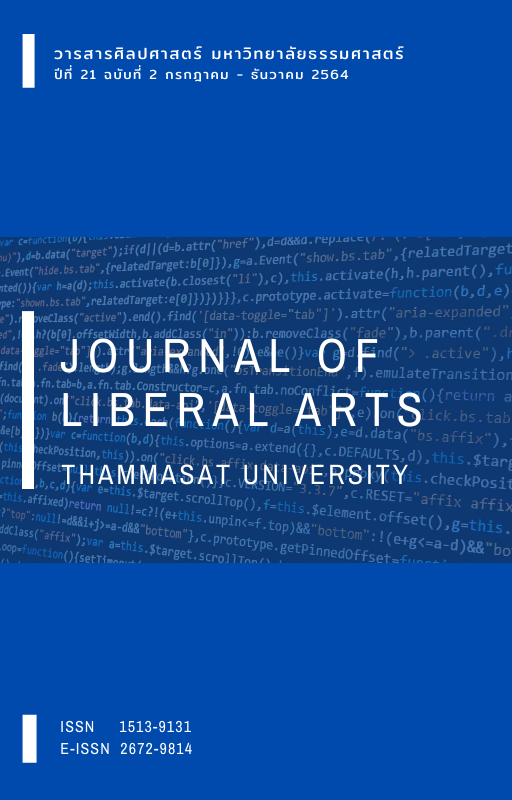Transformation initiation of leaders: Success factors of leadership approaches to social innovation development for model communities
Main Article Content
Abstract
This study focuses on success factors of leadership approaches to social innovation development for model communities. This paper uses a qualitative methodology with in-depth interviews for data acquisition. The researchers conducted narrative research with two community leaders as key informants. After that, the context is analyzed in phenomenology research design. The main finding is that successful factors of two leaders were considering wellbeing, providing paradigms and communicating leader action. This would be beneficial for community development whose context is similar to the community in the research and can also be used to develop the two target communities into the future.
Downloads
Article Details

This work is licensed under a Creative Commons Attribution-NonCommercial-NoDerivatives 4.0 International License.
References
กัลยารัตน์ ธีระธนชัยกุล. (2562). พฤติกรรมองค์การและการพัฒนาองค์การ. ซีเอ็ดยูเคชั่น.
กาญจนา แสงลิ้มสุวรรณ. (2555). นวัตกรรมทางสังคม: ประโยชน์ที่มีมากกว่าที่คิด. วารสารนักบริหาร มหาวิทยาลัยกรุงเทพฯ, 32(3), 12-15.
การท่องเที่ยวแห่งประเทศไทย. (2563). การนำเสนอทิศทางการส่งเสริมการท่องเที่ยว ของ ททท. ปี 2563. https://www.tatreviewmagazine.com/article/tourism-direction-2020/
ชัยเสฏฐ์ พรหมศรี. (2561). ภาวะผู้นำสำหรับผู้บริหารองค์การ: แนวคิด ทฤษฎีและกรณีศึกษา. ปัญญาชน.
ชานนท์ โกมลมาลย์. (2561). นวัตกรรมทางสังคมเพื่อขับเคลื่อนสุขภาวะโดยการมีส่วนร่วมของเด็กและเยาวชน. วารสารสังคมสงเคราะห์, 26(1), 120-145.
ณัฏฐ์ ชาคำมูล, ฉันทนา จันทร์บรรจง, ภานุวัฒน์ ภักดีวงศ์, และอนุชา กอนพ่วง. (2556). รูปแบบการพัฒนาภาวะผู้นำเชิงเปลี่ยนผ่านทางสังคมของผู้บริหารสถานศึกษาสังกัดสำนักงานคณะกรรมการการศึกษาขั้นพื้นฐาน, วารศึกษาศาสตร์ มหาวิทยานเรศวร, 15(2), 35-45.
ทวิภัทร บุณฑริกสวัสดิ์. (2561). นวัตกรรมสังคม: ลักษณะ กระบวนการและรูปแบบในด้านต่างๆ. ฐานข้อมูล Youth Innovation Organization, shorturl.at/buBI4
ธมลณัฏฐ์ อุดมพันธุ์, และมณีรัตน์ ภาคธูป. (2559). ความสัมพันธ์ระหว่างรูปแบบภาวะผู้นำของหัวหน้าหอผู้ป่วยในกับการจัดการความขัดแย้งในโรงพยาบาลเอกชน. วารสารวิชาการมหาวิทยาลัยอีสเทิร์นเอเชีย, 10(2), 224-234.
ปิยะพงษ์ ทองดี. (2561). ภาวะผู้นำขององค์การสมัยใหม่. วารสารร่มพฤกษ์ มหาวิทยาลัยเกริก, 36(1), 67-87.
มูลนิธิชัยพัฒนา. (2560). เศรษฐกิจพอเพียง. https://www.chaipat.or.th/site_content/item/3579-2010-10-08-05-24-39.html
รัฐบาลไทย. (2559). กรอบยุทธศาสตร์ชาติระยะ 20 ปี (พ.ศ. 2560-2579). http://www.thaigov.go.th/uploads/document/22/2016/09/pdf/p1.pdf
รัตติกรณ์ จงวิศาล. (2559). ภาวะผู้นำ: ทฤษฎี การวิจัย และแนวทางสู่การพัฒนา. สำนักพิมพ์แห่งจุฬาลงกรณ์มหาวิทยาลัย.
รุ่งอรุณ วัฒยากร, และอนุชา กอนพ่อง. (2559). ประวัติชีวิต และภาวะผู้นำเชิงคุณลักษณะของหมอเมืองพล. วารสารปัญญาภิวัตน์, 8(3), 135-148.
วงค์เดือน ภานุวัฒนากูล. (2552). อัตลักษณ์ของคนไทยเชื้อสายจีนท่ามกลางความหลากหลายทางวัฒนธรรม [วิทยานิพนธ์ปริญญามหาบัณฑิต]. มหาวิทยาลัยสงขลานครินทร์.
อานันท์ กาญจนพันธุ์. (2559). ทุนทางสังคมกับการพัฒนาเมือง. เดือนตุลา.
อารีย์ นัยพินิจ, ธงพล พรหมสาขา ณ สกลนคร. (2555). ลักษณะของผู้นำที่ดีในการบริหารองค์ปกครองส่วนท้องถิ่น, วารสารมนุษย์ศาสตร์และสังคมศาสตร์, 29(2), 97-112.
Alfes, K., Truss, C., & Gill, J. (2010). The HR manager as change agent: Evidence from the public sector. Journal of Change Management, 10(1), 109-127.
Alqatawenh, A, S. (2018). Transformational Leadership Style and Its Relationship with Change Management. Verslas: Theorijia ir Praktika/Business: Theory and Practice, 19, 17-24. https://doi.org/10.3846/btp.2018.03
Bass, B. M. (1985). Leadership and performance beyond expectation. Free Press.
Bass, B. M., & Avolio, B. J. (Eds.). (1994). Improving organizational effectiveness through transformational leadership. Sage.
Bass, B. M., & Riggio, R. E. (2006). Transformational leadership. Psychology press.
Burnes, B. (2004). Kurt Lewin and the planned approach to change: a re‐appraisal. Journal of Management studies, 41(6), 977-1002.
Burns, J. M. (1978). Leadership. Harper & Row.
Caldwell, C., Dixon, R, D., Floyd, L, A., Chaudoin, J., Post, J., & Cheokas, G. (2012). Transformative Leadership: Achieving Unparalleled Excellence. Journal of Business Ethics, 109(2), 175-187.
Hechanova, R. M., & Cementina-Olpoc, R. (2013). Transformational leadership, change management, and commitment to change: A comparison of academic and business organizations. The Asia-Pacific Education Researcher, 22(1), 11-19.
Horstmann, A. (2012). Multiculturalism in Thailand: Concept, Policy and Practice. https://lc.mahidol.ac.th/lcjournal/FullPaper/JLC32-1-Alexander-HM.pdf
Huarng, K. H., & Mas-Tur, A. (2016). Turning Kurt Lewin on his head: Nothing is so theoretical as a good practice.
Journal of Business Research, 69(11), 4725-4731. DOI: https://doi.org/10.1016/j.jbusres.2016.04.022.
Kingsley, J., Foenander, E., & Bailey, A. (2020). It’s about community: Exploring social capital in community gardens across Melbourne, Australia. Urban Forestry & Urban Greening, 49, 126640. https://doi.org/10.1016/j.ufug.2020.126640.
Ministry of Agricultural and Cooperative. (2017). National Strategy (2018-2037). https://www.moac.go.th/pyp-dwl-files-402791791893
Murray, R., Mulgan, G., & Caulier-Grice, J. (2008). Generating Social Innovation: Setting an Agenda, Shaping Methods, and Growing the Field. http://www.socialinnovationexchange.org/node/1167
Opollo, J. G., Busby, A, L., Foreman, K., & Richardson, D. (2014). Nursing Administrative Officer: Transforming Nursing Leadership in Acute-Care Hospitals. Nurse Leader, 12(6), 84-90. https://doi.org/10.1016/j.mnl.2014.04.005
Phills, J. A., Deiglmeier, K., & Miller, D. T. (2008). Rediscovering social innovation. Stanford Social Innovation Review, 6(4), 34-43.
Pol, E., & Ville, S. (2009). Social innovation: Buzz word or enduring term?. The Journal of socio-economics, 38(6), 878-885.
Schein, E. H. (1996). Kurt Lewin's change theory in the field and in the classroom: Notes toward a model of managed learning. Systems practice, 9(1), 27-47.
Steger, M. (2017). Globalization: A very short introduction (4th ed.). Oxford University Press.
Surji, K. (2015). Understanding Leadership and Factors that Influence Leaders' Effectiveness. European Journal of Business and Management, 7(33), 154-167. DOI: 10.7176/EJBM/7-33-2015-03
Suutari, V. (2002). Global leader development: An emerging research agenda. Career Development International.
Tourism Authority of Thailand. (2020). Amazing Thailand. https://www.tourismthailand.org/


